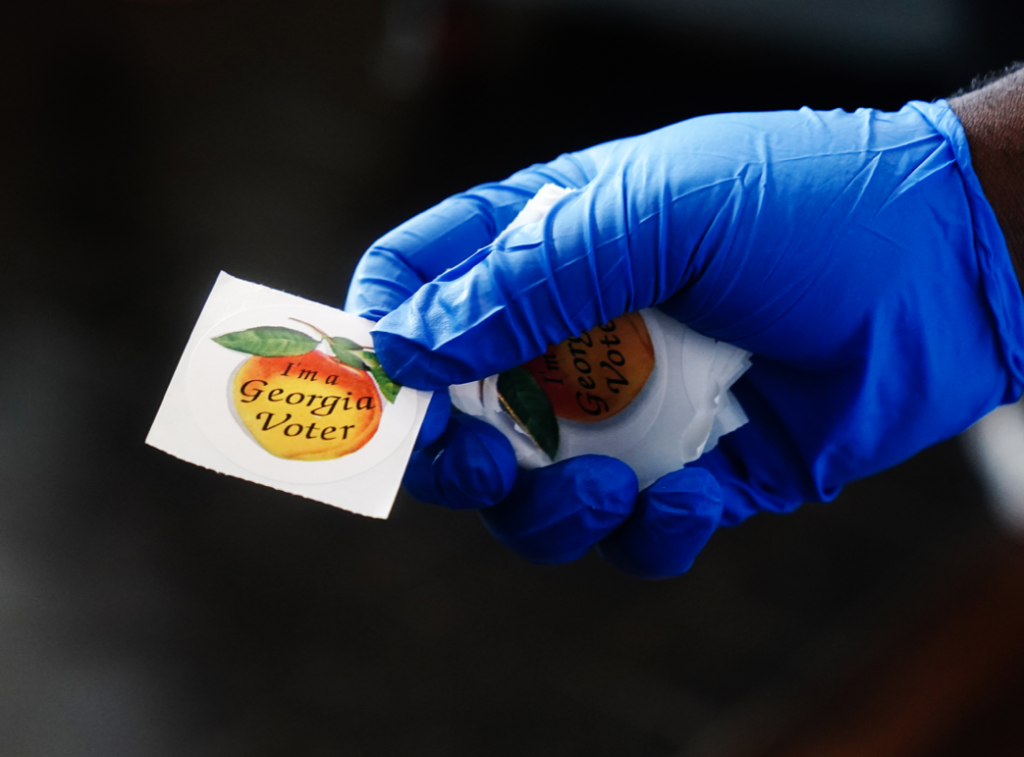Election Security or Voter Suppression? Georgia Voting Reform Bill Incites Widespread Controversy and Exacerbates Political Tensions

Image Courtesy of NBC News
By Justin Lamoureux
Georgia made significant headwaves in this past election cycle when it voted Democratic at the presidential level for the first time since 1992, and further rebuked its contemporary political leanings by awarding both of its U.S. Senate seats to Democrats. Several months later, the Peach State once again finds itself in the center of the political universe. This time, however, the dialogue revolves entirely around one issue: What future elections should look like.
Branded as “The Election Integrity Act of 2021,” Georgia Republicans are calling this legislation a necessary measure to “boost confidence” in elections after the 2020 election saw Former President Trump make repeated, unsubstantiated claims of voter fraud. The bill includes 16 provisions which effectively revamp the state’s election laws. These include less time to request an absentee ballot, and a limited number of drop boxes (to provide some context, in the last election, 94 drop boxes could be found throughout the Atlanta metropolitan area. The new law reduces that to a maximum of 23 boxes). It also allows for less time between general elections and runoffs, which will make such contests harder to manage (specifically, in terms of how ballots are distributed). Some of the better-known elements of the legislation include giving state officials the power to take over local election boards, and making it a crime to approach voters in line and give them food or water.
While many aspects of the bill are seemingly designed to make casting a ballot more difficult, others are geared towards improving how elections are organized. This would be done primarily by streamlining the process at the local level. For example, the bill would allow officials to process absentee ballots sooner, and forbid them to stop counting ballots once the polls have closed. It also provides greater flexibility in terms of the voting equipment utilized for smaller, lower-turnout races. The legislation grants poll workers the right to serve in counties beside their own; such a provision is designed to combat any future shortages of trained workers, as was seen in several parts of the state during last year’s election.
While many Republicans have applauded the bill for promoting “election integrity,” it has faced substantial opposition from Democratic lawmakers and operatives. Collectively, the legislation has been painted by Democrats as “part of a national Republican effort that aims to restrict access to the ballot box following record turnout in the election.” President Biden also criticized the act, deeming it “un-American” to restrict voter access to such an extent. Stacey Abrams, founder of Fair Fight Action and the 2018 Democratic nominee for Governor of Georgia, posited that Republicans are bent on “reviving Georgia’s dark past of racist voting laws,” and underscored the need for federal action to protect voting rights.
In a highly controversial move, Georgia State troopers arrested some Democratic lawmakers when they visited Governor Brian Kemp’s office in protest of the bill. Most notably, State Representative Park Cannon was apprehended when she knocked on Governor Kemp’s door and asked to discuss the bill. While legal charges against Cannon were ultimately dropped, the Fulton County Department of Public Safety website noted that she was accused of willfully obstructing law enforcement officers by use of threats or violence, and attempting to disrupt general assembly sessions. A trio of voting groups – the New Georgia Project, the Black Voters Matter Fund, and Rise Inc. – have already filed a lawsuit challenging this legislation. They argue that it disproportionately harms black voters, and denies them a fair opportunity to participate in the political process.
Georgia’s top election officials both pushed back on national criticisms of the bill. Gabriel Sterling – the chief operating officer in the Secretary of State’s office – asserts that President Biden “is just simply wrong” to characterize such laws as voter suppression. He believes such claims have “the same level of merit” as when Former President Donald Trump alleged there was widespread voter fraud in the state. Sterling argues that increased use of absentee ballots essentially requires the state to require stricter verification. In his view, this law is a “better administration item” that presents an alternative to former protocols, which “undermined people’s faith” in the process of signature matching. Sterling anticipates it will lead to lower rejection rates for absentee ballots. He also hopes that said legislation will strengthen the process by protecting no-excuse absentee voting, and mandating the continued use of drop boxes. The latter, he attests, “have never been a part of Georgia law until now.”
Sterling has been especially pointed in his criticism of Stacey Abrams, and her stance on the bill. He alleges that Fair Fight and their Democratic counterparts are demonizing the legislation as a means of inspiring political fear; their objective, he suspects, is to exploit the “voter suppression” narrative as a means of raising money and gaining support for their political agenda. Accusing Abrams of spreading “the same kind of disinformation President Trump was about mass voter fraud,” Sterling claims that both she and the former president have attempted to “undermine democracy in people’s faith in the overall election system.”
Brad Raffensperger, Georgia’s Secretary of State, also voiced support for the legislation. “Many of the measures are good measures,” the Secretary of State notes, invoking his support for provisions that require voters to include their Georgia driver’s license or state ID number on absentee ballot applications. Anyone without a state-issued ID has the option to include a photocopy of a utility bill, bank statement, paycheck or government check. Election employees will utilize such documentation to verify a voter’s identity, instead of comparing their signature.
On the flip side, however, Raffensperger disagrees with the portion of the bill that strips him of his position as chair of the state election board, and replaces him with someone appointed by the Speaker of the House. Expressing concerns regarding the ability to hold such individuals accountable, Raffensperger predicts this is “something that voters in Georgia will probably regret in the future.” Like Sterling, Raffensperger has concerns about the level of misinformation surrounding the bill; specifically, the ideas being promoted by Stacey Abrams and Democrats.
Raffensperger’s perspective may not be relevant for long, though – Congressman Jody Hice, a Republican representative who supported efforts to overturn the election results, has already declared his intention to challenge the Secretary of State’s re-election bid next year. Trump has already endorsed Hice, arguing that “unlike the current Georgia secretary of state, Jody leads out front with integrity.” Traditionally, candidates endorsed by the former president have won handily in their respective primary; given the former president’s continuous popularity – and seemingly unchanged influence over the party establishment – this could put Raffensperger in a precarious situation moving forward.
While this bill has attracted scathing criticism from a number of prominent Democratic lawmakers and activists, it has also been met with fierce opposition from the bulk of a more influential third party: Corporate America. Perhaps most consequentially, Major League Baseball (or MLB) has decided to pull the eagerly anticipated All-Star games from Atlanta in protest of the law. Unsurprisingly, the response to this decision varied largely along party lines. Stacey Abrams expressed disappointment with the league’s decision, but is “proud of their stance on voting rights.” She argued that Georgia Republicans are effectively trading economic opportunity for voter suppression. A number of Democratic lawmakers – including President Biden and U.S. Senator Jon Ossoff – share Abrams’ sentiments. Conversely, the move has incensed several Republican lawmakers. This includes Georgia Governor Brian Kemp, who accused the MLB of surrendering to “fear” and “political opportunism,” while lambasting “cancel culture” and “woke political activists.”
Major League Baseball is by no means an outlier – Several other corporations, including Coca-Cola and Delta Airlines (both of which are headquartered in Atlanta) have also condemned the laws. Such viewpoints have resulted in denunciation from Senate Minority Leader Mitch McConnell (R – KY), who advised such corporations to “stay out of politics” and to not “pick sides in these big fights.” It should be noted, however, that McConnell is a well-known recipient of corporate donations; In 2010, he even hailed the Supreme Court’s “Citizens United” ruling, which struck down limits on corporate political donations, on the grounds that corporations are “people” under the First Amendment to the Constitution. U.S. Senator Marco Rubio (R – FL), meanwhile, referred to executives of these companies as “woke corporate hypocrites,” and openly questioned on Twitter why the opinions of such entities yield any influence.
It should be noted that, while a number of states are following Georgia’s example, some have chosen to take a markedly different approach to revising their election laws. Last month, Kentucky’s Republican-controlled state legislature passed a bill that would expand early voting, and make it easier to obtain an absentee ballot. It allows for greater use of technology when tabulating votes, and makes it easier for candidates to request a recount. The legislation passed 91-3 in the State House of Representatives, and 33-3 in the Senate. There was strong bipartisan support for the legislation, which was signed into law by Democratic Governor Andy Beshear.
In addition to voicing concerns about the impact of Georgia’s new voting laws, Congressional Democrats are working to counter such legislation with their own bill. Commonly known as the “For the People Act,” it seeks to make voter registration an easier process, and restrict states’ abilities to drop voters from registration lists. Additionally, it would enfranchise millions of former felons, end gerrymandering, and improve election cybersecurity to reduce the perceived threat of foreign interference. In a nod to progressive activists, the bill would also create a public financing system, and limit the influence of big donors. While most Democrats consider the bill to be a highly exigent matter (the Biden White House has even declared it is “urgently needed to protect the right to vote”), Republicans have decried the bill as an attempt to unfairly influence elections. For example, U.S. Senator Tommy Tuberville (R – AL) classified it as a “partisan” attempt to give Democrats an advantage at the polls.
In some respects, debate over “The Election Integrity Act of 2021” reflects the ongoing battle regarding the legitimacy of last year’s election results. Republicans continue to make arguments for enhanced election security, positing that greater regulation of the process is necessary to ensure maximum integrity of results. A majority of GOP lawmakers believe this bill is critical to achieving such ends. Democrats, meanwhile, remain focused on making elections better accessible to voters, and combating alleged attempts to suppress the vote. This legislation, they believe, is dangerous to the equity and inclusivity of the electoral process. Georgia, in a testament to the state’s newfound electoral significance, is “ground zero” in this battle. While the long-term effects of such legislation will not be known for some time – and will largely be interpreted along party lines – discussions of how future elections should be conducted will likely dominate the political dialogue for the foreseeable future.







